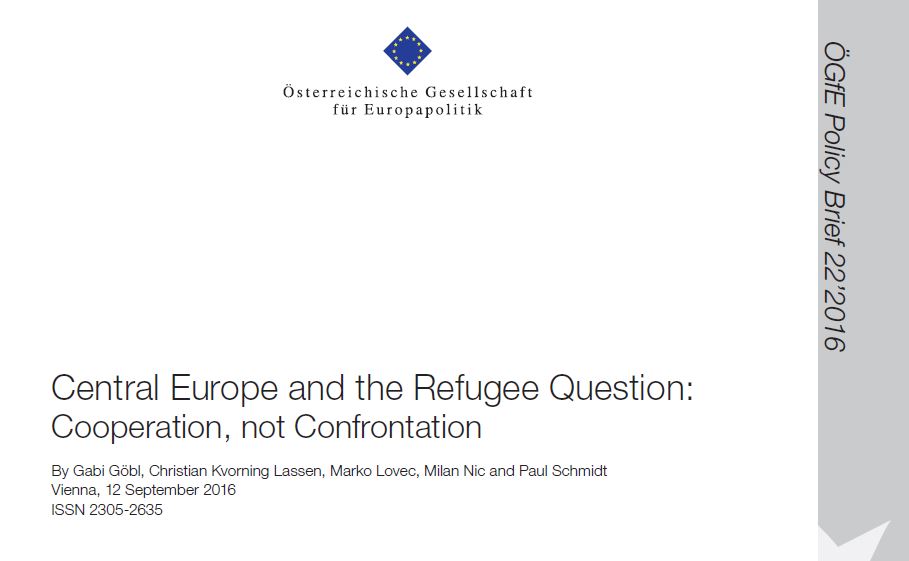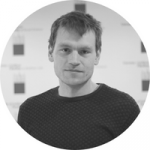Policy Recommendations
- To tackle the refugee and migration question a cross-border multi-level dialogue needs to be fostered not only between governments and public authorities in Central Europe, but also between civil society players and the media.
- A counter-narrative has to be told offering a broader – not only security based – perspective and explaining the complexities.
- In reply to the perception of a single, unsupportive Central European block the societal and historical particularities of Central European countries have to be emphasized, explaining the backgrounds and countering stigmatization.
Abstract
The uncoordinated approaches in Central Europe in dealing with the increased arrivals of refugees during summer and autumn of 2015 have put the region into the spotlight of public attention. A new split in Europe was widely proclaimed. With the closure of the Balkan route in March 2016 and the implementation of the EU-Turkey action plan the numbers of arrivals have decreased. However, those expecting these steps to be the solution of the refugee and migration question will be severely disillusioned.
Taking into account the particularities of Central European countries, obligatory quotas – as proposed by the European Commission – are not the most promising solution at this moment. The focus should rather be on possible common ground – such as substantial financial aid on the spot, commitment to common external border management, the functioning of Schengen as well as legal ways to request asylum from outside of the European Union. Quotas could be left for discussion at a later stage. But further actions can be taken now to promote future integration capacities in the region. These should also include an intensified cooperation among NGOs and media across borders, the joint promotion of a counter-narrative and stronger partnerships between the civil society and governments. In the end, the refugee and migration question is a cross-border challenge, which does not go away by closing borders. It can only be confronted together.
****************************
Central Europe and the Refugee Question:
Cooperation, not Confrontation
A new split in Europe?
Austria, the Czech Republic, Hungary, Slovakia and Slovenia are five countries in Central Europe, whose total size covers about half the area of France.[1] Their capitals are in many cases located closer to each other than major cities within their respective countries. Their citizens do not only share parts of their history, but also many aspects of their culture and traditions. Also in economic terms, the five countries are strongly interconnected.
It comes, thus, as no surprise that these countries are often confronted with similar regional challenges. Still, solutions are in many cases drafted on a national level only and proximity does not prevent misunderstandings. This became particularly obvious in the late summer of 2015, at the peak of the refugee and migration policy crisis. Some countries started to wall themselves in, while others decided to suspend the Dublin agreement or open borders. In the end, it led to the impression of a new split in Europe.
Various “shades of grey”
While all five countries definitely have their differences, it has been obvious from the very first moment that things are not as black and white as media and politics liked to draw them, but rather reflect various “shades of grey”. It can therefore be helpful to take a look at the various country situations in some more detail.[2]
[zitat inhalt=”While all five countries definitely have their differences, it has been obvious from the very first moment that things are not as black and white as media and politics liked to draw them.”]
Among the five countries, Austria is the only target destination receiving more than a hundred thousand refugees and migrants. 85,505 people have applied for asylum in 2015.[3] Up to 37.500 might follow in 2016.[4] Many individuals as well as civil society organizations have provided help to refugees. Consequently, other European neighbors were criticized for their lack of solidarity.[5] However, there is also a perception that neighboring countries – among others – have not been sufficiently consulted ex ante. After the incidents in Cologne at the end of 2015 resistance in Austria towards further asylum seekers increased. On the political level, discussions how to tackle the issue intensified ever since bringing up topics like social benefits and the needs-based minimum benefit system.
In Slovenia – rather a transit than a target country – a humanitarian view prevailed when the influx of refugees and migrants increased in summer of 2015. The country already contributed to the Italian search and rescue operation Mare Nostrum. While Hungary’s decision to build a fence at the Slovenian border was heavily criticized by both the general public and the government, Slovenia did not oppose the relocation quotas and the decision by Germany and Austria to suspend the Dublin regulation. Perceptions of a chaotic “handling” of the transit from Croatia towards Austria in autumn 2015 as well as security concerns[6] have strongly influenced public opinion. Faced with immigration pressure and criticism at home, government responded by focusing on security aspects of the issue. With the Balkan route closed and the EU-Turkey action plan in place, humanitarian aspects are back on the agenda, even though concerns about challenges such as long integration periods and fear of mass integration still exist. In Slovenia civil society and charity organizations also played a crucial role in providing humanitarian aid. Today the number of refugees Slovenia decided to take in is still small.[7] Focusing on positive experiences, especially of some smaller Austrian municipalities, individual Slovene municipalities felt encouraged in welcoming refugees.
In Slovakia, heated statements of political leaders making international headlines and the country’s vehement rejection of the mandatory quotas earned the country a notorious reputation of a quota-refusing Muslim-cautious place. However, this perception is not entirely objective either. Despite the often very harsh political rhetoric, the Slovak government has done more than it is being publicly credited for[8], and also the civil society has been mobilized. In summer 2015, Slovak civil society launched the “Plea for Humanity” campaign, which attracted support from major celebrities, athletes, corporations and the President. But not only established humanitarian NGOs were there to help. Hundreds of self-organized and non-institutionalized volunteers went to the Balkan route and/or to Austrian reception centers to provide their share of assistance. After the 2016 national election campaign, the fierce political rhetoric has calmed down. The current Presidency of the EU Council should provide a window of opportunity for more constructive actions[9].
Despite the fact that the Czech Republic has little actual experience with refugees and migration[10], mainstream media increasingly depict a picture of dire consequences of Muslim migration. A stance that is also represented by main actors of Czech politics as President Zeman, Deputy Prime Minister and Minister of Finance Babis, and Minister of the Interior Chovanec, who are pushing a strong anti-immigrant position while Prime Minister Sobotka is characterized by a more moderate approach. Of those refugees arriving in the country, the most dominant group though are Ukrainians[11], who blend in much more easily than refugees from the MENA[12] countries. Thus, the Czech resistance to migration primarily revolves around Muslim immigrants rather than any type of immigrants[13], although opposition to migration in general has increased as a corollary to the former.[14] Nevertheless, civil society players in the capital and some larger cities, and in particular groups of students, are trying to combat the fears of the “known unknown”. Little attention is paid to potential positive effects of migration: especially due to the growing economy – the Czech Republic has the lowest unemployment rate in Europe[15] and is in an acute demand for labor – a gap that could also be filled from the pool of migrants.
In comparison, Hungary is politically probably the most rigid country. Already in January 2015 Prime Minister Orban launched a – still ongoing[16] – coordinated campaign that demonized migrants as a threat to national security. FIDESZ’s hold over Hungarian politics effectively negates the power of traditional actors that can resist an anti-migration rhetoric and policies: the judiciary (under government control), the parliamentary opposition (weak and fragmented), and the media (either government controlled or engaging in self-censorship). Civil society is left to counteract government actions and to promote a pro-refugee frame, but does not possess enough social capital to be effective on its own. However, these asymmetrical power relations forced refugee-help groups and grass-root movements to adopt new approaches.[17] As the centerpiece of these efforts local civil society assisted refugees along the border and in Budapest’s transit zones, established during the summer of 2015. Here, civil society effectively had to take over the state’s responsibilities and showed never before seen activism and resolve.
The way forward
The various national developments clearly demonstrate different degrees of acceptance and experience with the influx of refugees and migrants in the countries concerned, as well as the need to establish sustainable networks for a smooth cultural and economic integration. Without the necessary political and societal support on the ground, an open and cooperative regional dialogue and the willingness to meet international obligations, the implementation of mandatory quotas is doomed to fail. Moreover, reality shows that many refugees simply would not want to stay in some of the countries[18] mainly due to missing networks, lower asylum acceptance rates, inferior country reputation and partly due to the different social systems[19].
Instead, the focus should rather be on possible common ground – such as a commitment to financial aid on the spot and a common external border management, the functioning of Schengen as well as legal ways to request asylum from outside the EU.
The focus should rather be on possible common ground – such as a commitment to financial aid on the spot and a common external border management, the functioning of Schengen as well as legal ways to request asylum from outside the EU.
To improve the level of acceptance of refugees in Central Europe, special attention should be given to civil society actors. In all five countries, civil society has provided help to refugees being well aware of the fact that order and control has to be maintained. Still, these players act in different political settings and often in an uncoordinated manner, having poor access to media, public attention and financial resources. Knowledge about and contacts with like-minded NGOs in the neighboring countries are limited.
- It is therefore essential to step up cross-border cooperation among NGOs and other civil society players. Much more needs to be done to facilitate a better understanding and develop communication strategies that add value to the efforts of NGOs in each country. Concrete actions could include the exchange of best practices and transfer of already tested solutions, as well as information regarding political, legal and societal developments. The organization of bi- or multilateral citizens’ dialogues can also strengthen the cross-border dimension. In the end, a mapping of the various networks and actors of NGOs, charity organizations, grassroots as well as individual and church related initiatives would be meaningful. Civil society organizations should thus intensify their efforts to receive support from the European level, while the European Commission should expand its programmes and resources to finance cross-border cooperation on this issue.
- A negative agenda tending to capitalize on the public fear of the unknown has led to a situation in which migration as a whole is mainly perceived as a threat. Civil society therefore needs to create a counter-narrative providing wider perspectives, be they historical or derived from neighboring countries. As NGO’s and even international organizations are often pigeonholed as biased, “public champions” – such as journalists, artists and viable politicians – should be addressed and equipped with data, numbers and views to effectively confront populism. Migration and security threats thereby have to be unlinked, especially by making clear that security is not only compatible with European values, but that it is a European value. Integration success stories[20] should be used to tell the stories of migrants and refugees on an individual basis, rather than as a collective entity. Furthermore, NGOs should jointly counter the radicalization of political language and the detrimental effect terminology may have, including the identification and sanctioning of hate speech.
- Although governments and civil society are mutually dependent on each other, they increasingly set off in opposite directions. Civil society organizations should strive to become active partners to governments and vice versa by raising awareness of problems requiring public policy responses. Whereas civil society should clearly define their role, the government authorities may consider using civil society organizations as a credible bridge to the general public. Special attention should be placed to windows of opportunity such as post-election periods or the current Slovak EU presidency.
- Civil society should help to contribute to higher journalistic scrutiny by intensifying contacts with media, providing know-how and media training for media representatives and connecting journalists from the various countries. A balanced view of developments – giving equal attention to opportunity rather than risk analysis – would be welcome.
As the view of a single, unsupportive Central European block is spilling over to other areas of European politics, it seems essential to explain the different underlying motives and promote societal change, without allowing to be held hostage by sometimes unidimensional and populistic governmental action. In the end, the refugee and migration question is a cross-border challenge for all of us. It can only be confronted together.[21]
[1] France has a total area of 643,801 km2, while Austria, the Czech Republic, Hungary, Slovakia and Slovenia in total cover an area of 325,074 km2. http://de.statista.com/statistik/daten/studie/326957/umfrage/flaechen-der-eu-laender/.
[2] For more details see: Joint Solutions for Common Challenges in Central Europe: Cross-Border Cooperation in the Refugee Crisis. https://oegfe.at/wordpress/wp-content/uploads/2016/07/Joint-Report_CBC_Refugees.pdf.
[3] Eurostat Pressemitteilung 44/2016: Asyl in den EU-Mitgliedstaaten: http://ec.europa.eu/eurostat/documents/2995521/7203837/3-04032016-AP-DE.pdf/9fcd72ad-c249-4f85-8c6d-e9fc2614af1b.
[4] Financial Times: German president backs refugee quotas as Austria sets first cap: http://www.ft.com/cms/s/0/14eab1c2-bf6d-11e5-846f-79b0e3d20eaf.html#axzz4FVVEfkue.
[5] A recent OEGfE-survey shows that the majority of the Austrian population has little understanding for the “refusing attitude of some neighboring countries regarding the admission of asylum seekers”. 36 per cent agreed to the restrictive position of the neighboring countries, whereas 60 per cent did not support this practice (4 per cent “don’t know/not specified”). Tel SWS 240, March 2016, N=519 respondents throughout Austria.
[6] Between summer 2015 and March 2016 800,000 people crossed the Western Balkan route, which is almost half of Slovene population. At the peak of the crisis, up to 12,500 refugees and migrants entered Slovenia each day, while total police force of Slovenia numbers half of that. https://oegfe.at/wordpress/wp-content/uploads/2016/07/Joint-Report_CBC_Refugees.pdf.
[7] 260 asylum seekers in 2015; 485 asylum seekers in the first quarter of 2016. Eurostat Pressemitteilung 44/2016: Asyl in den EU-Mitgliedstaaten: http://ec.europa.eu/eurostat/documents/2995521/7203837/3-04032016-AP-DE.pdf/9fcd72ad-c249-4f85-8c6d-e9fc2614af1b.
[8] E.g. the small Slovak border town, Gabcikovo, has been hosting on a rotating basis 500 Syrian asylum seekers based upon an agreement with the Austrian government, 150 Iraqi Christians have been resettled from the Mosul area, Slovak officers have been sent to the European Asylum Support Office in Greece and NGOs have been supported financially and organizationally in their “Plea for Humanity”.
[9] Slovak government has already pledged 200 spots on a “voluntary” basis and committed to a “sustainable” migration policy. However, the implementation of this promise is yet to be delivered.
[10] 1,235 asylum seekers in 2015; 360 asylum seekers in the first quarter of 2016. Eurostat Pressemitteilung 44/2016: Asyl in den EU-Mitgliedstaaten: http://ec.europa.eu/eurostat/documents/2995521/7203837/3-04032016-AP-DE.pdf/9fcd72ad-c249-4f85-8c6d-e9fc2614af1b.
[12] Middle East and North Africa
[13] http://domaci.ihned.cz/c1-64371570-uprchliky-ze-syrie-a-severni-afriky-v-cesku-nechce-70-procent-lidi-ukazuje-pruzkum.
[14] http://cvvm.soc.cas.cz/media/com_form2content/documents/c1/a7549/f3/pm160422a.pdf.
[15] Eurostat (2016): Unemployment rates, seasonally adjusted: http://ec.europa.eu/eurostat/statistics-explained/index.php/File:Unemployment_rates,_seasonally_adjusted,_May_2016.png.
[16] Referendum on refugee quotas in Hungary: http://www.nepszavazas2016.kormany.hu/.
[17] Zalan, E. (2016): Hungary’s satire party takes on migrant referendum: EU Observer: https://euobserver.com/news/134869.
[18] In the Czech Republic, for example, an incident of 89 repatriated Iraqi Christian refugees, of which 25 subsequently fled to Germany to apply for German asylum after withdrawing their asylum applications in the Czech Republic, have further compounded the prevailing view in Czech society that refugees are economic migrants first and fleeing war second, which has exacerbated the strong anti-immigration bias.
[19] Bundesamt für Migration und Flüchtlinge (2013): Warum Deutschland? http://www.bamf.de/SharedDocs/Anlagen/DE/Publikationen/Forschungsberichte/fb19-warum-deutschland.pdf?__blob=publicationFile.
REACH: Migration trends & patterns of Syrian asylum seekers travelling to the European Union (2015): https://data.unhcr.org/syrianrefugees/download.php?id=11112 (PDF).
[20] E.g. the promotion of „integration ambassadors“ in Austria is a case in point: https://www.zusammen-oesterreich.at/startseite/
[21] Göbl, G., Kvorning Lassen, C., Lovec, M., Nic, M., Schmidt, P. (2016): Why Central Europe needs a unified strategy for tackling the migration crisis. LSE EUROPP Blog: http://blogs.lse.ac.uk/europpblog/2016/08/15/why-central-europe-needs-a-unified-strategy-for-tackling-the-migration-crisis/.
Göbl, G., Kvorning Lassen, C., Lovec, M., Nic, M., Schmidt, P. (2016): Zentraleuropa: Kooperation statt Blockdenken. Der Standard: http://derstandard.at/2000042490708/Zentraleuropa-Kooperation-statt-Blockdenken.
ISSN 2305-2635
The views expressed in this publication are those of the author and not necessarily those of the Austrian Society of European Politics or the organisation for which the author works.
Keywords:
Central Europe, refugee, migration, cross-border cooperation
Citation
Göbl, G., Kvorning Lassen, C., Lovec, M., Nic, M., Schmidt, P. (2016). Central Europe and the Refugee Question: Cooperation, not Confrontation. Vienna. ÖGfE Policy Brief, 22’2016
Hinweis:
Zu diesem Policy Brief ist auch ein Gastkommentar in deutscher Sprache in der Tageszeitung DER STANDARD erschienen.











